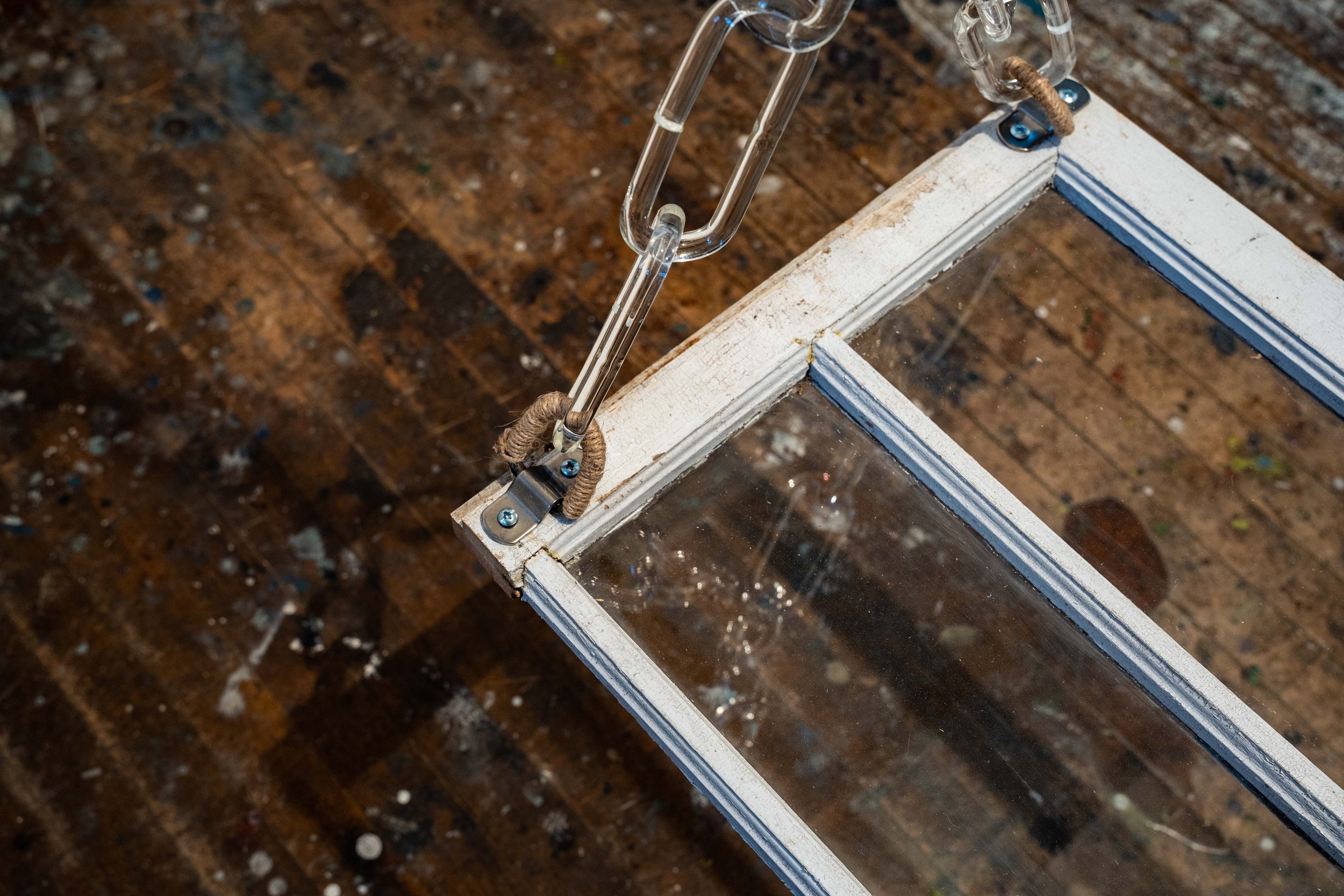Glass Factory
“Solidity, coldness, fragility,/ these are the price of transparency”—these lines from Ouyang Jianghe’s “Glass Factory,” from which the artwork draws its title, speak of the hidden labor that goes into producing and maintaining conceptual “transparency.” For the majority of factory workers, similarly, the category of “childhood”—at least its bourgeois association with play and leisure—is a luxury that must be bought at great costs, and is liable to shatter at the slightest misstep. The artwork points to this asymmetry, replacing the durable parts of a swing with delicate, and highly fragile glass.
Glass Factory
Glass, window pane (wood, metal)
90' x 30' x 15'
2022
Glass Factory
By Ouyang JiangHe
1
Between seeing and seeing, there is only glass.
Between face and face
the division cannot be seen.
Within glass, matter is not transparent.
The whole glass factory is a giant eye,
labor its pupil.
Its daylight shimmers in the core of things.
Things which insist on the first tears,
as birds in a field of pure light insist on shadows.
Using dark to retake, and then deliver, light.
Everywhere there are glass places,
glass which is already not itself, but
a kind of spirit.
Just as everywhere there is air, air verging on nothingness.
2
Near the factory is the sea.
To know water is to know glass.
Solid, cold, fragile,
this is the price of transparency.
Transparency is a secret, wave-savvy language,
when I speak it I have already left it behind,
left behind the glass, the teacup, the mirror, these
specific material things, produced in batches.
But my body is also engirthed by the material,
my life charged with desire.
Language overflows, is exhausted, before transparency.
Language is flight, is
vastness faced with vastness, lightning with lightning.
These many days are outside the bodies of birds,
and the shadow of a single bird
can be the faintest scar on the ocean.
What glides across the glass, lighter than shadow,
deeper than a wound, harder to surpass than the blade’s edge.
The cut cannot be seen.
3
I came, I saw, I spoke.
Language and time thicken, mud and silt as well.
A blindness dislodged from the center.
The same happens in glass.
The roar of fire, the heart of fire.
What is called glass is water’s attitude changing within fire,
is the meeting of two spirits,
two extinguishings entering the same eternity.
Water going through fire turns into glass,
turns into a burning colder than ice,
like a principal or an feeling
plain, clear, refusing to flow.
In fruit, in the depths of the sea, water never flows.
4
Then the glass I see—
as before is rock, yet now is not hard.
As before is fire, but now gives back no warmth.
As before is water, but now is neither soft nor flowing.
It is a wound but does not bleed,
it is a sound but is not surrounded by quiet.
From losing to losing, this is glass.
The transparency of language and time
comes at a high cost.
5
In the same factory I see three types of glass:
material, decorative, symbolic.
People tell me glass was born out of the chaos of stone.
In the absence of stone, death is not the end,
but is a kind of changeable primitive fact.
Rock crumbles, glass is born.
This is real. But there is another reality
that brings me to a type of state: from height to height.
In that reality glass is merely water, is already
or right now hardening, ossifying, unspillable water,
and fire is cold that cuts to the bones,
as well as the most beautiful and the easiest to shatter.
The loftiest things in the world, and
their tears.
Translate by: Henry Zhang
玻璃工厂
欧阳江河
(一)
从看见到看见,中间只有玻璃。
从脸到脸
隔开是看不见的。
在玻璃中,物质并不透明。
整个玻璃工厂是一只巨大的眼珠,
劳动是其中最黑的部分,
它的白天在事物的核心闪耀。
事物坚持了最初的泪水,
就像鸟在一片纯光中坚持了阴影。
以黑暗方式收回光芒,然后奉献。
在到处都是玻璃的地方,
玻璃已经不是它自己,而是
一种精神。
就像到处都是空气,空气近乎不存在。
(二)
工厂附近是大海。
对水的认识就是对玻璃的认识。
凝固,寒冷,易碎,
这些都是透明的代价。
透明是一种神秘的、能看见波浪的语言,
我在说出它的时候已经脱离了它,
脱离了杯子、茶几、穿衣镜,所有这些
具体的、成批生产的物质。
但我又置身于物质的包围之中,
生命被欲望充满。
语言溢出,枯竭,在透明之前。
语言就是飞翔,就是
以空旷对空旷,以闪电对闪电。
如此多的天空在飞鸟的躯体之外,
而一只孤鸟的影子
可以是光在海上的轻轻的擦痕。
有什么东西从玻璃上划过,比影子更轻,
比切口更深,比刀锋更难逾越。
裂缝是看不见的。
(三)
我来了,我看见,我说出。
语言和时间浑浊,泥沙俱下,
一片盲目从中心散开。
同样的经验也发生在玻璃内部。
火焰的呼吸,火焰的心脏。
所谓玻璃就是水在火焰里改变态度,
就是两种精神相遇,
两次毁灭进入同一永生。
水经过火焰变成玻璃。
变成零度以下的冷峻的燃烧,
像一个真理或一种感情
浅显,清晰,拒绝流动。
在果实里,在大海深处,水从不流动。
(四)
那么这就是我看到的玻璃——
依旧是石头,但已不再坚固。
依旧是火焰,但已不复温暖。
依旧是水,但既不柔软也不流逝。
它是一些伤口但从不流血,
它是一种声音但从不经过寂静。
从失去到失去:这就是玻璃。
语言和时间透明,
付出高代价。
(五)
在同一个工厂我看见三种玻璃:
物态的,装饰的,象征的。
人们告诉我玻璃的父亲是一些混乱的石头。
在石头的空虚里,死亡并非终结,
而是一种可改变的原始的事实。
石头粉碎,玻璃诞生。
这是真实的。但还有另一种真实
把我引入另一种境界:从高处到高处。
在那种真实里玻璃仅仅是水,是已经
或正在变硬的、有骨头的、泼不掉的水,
而火焰是彻骨的寒冷,
并且最美丽的也最容易破碎。
世间一切崇高的事物,以及
事物的眼泪。




